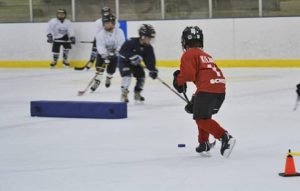How to become a Hockey Referee
Contents
A hockey referee is a person who makes decisions about whether or not a violation of the rules of the game has occurred.
A hockey referee is a person who makes decisions about whether or not a violation of the rules of the game has occurred. You might think knowing that a referee is a person seems obvious, but it’s important to understand because some people use the term “referee” to mean all on-ice officials: referees and linesmen.
The main responsibility of an NHL referee is to determine if there has been a penalty or violation of the rules, and then call that penalty by announcing it over his microphone and by signaling for one hand with both arms. A referee may give this signal for penalties such as tripping, hooking, slashing, holding, high-sticking, spearing, elbowing and boarding.
Oftentimes when you hear someone say “the refs made bad calls,” they are referring only to referees and not other people on ice like goal judges (who determine whether or not goals were scored) and linesmen (who handle faceoffs).
The referee is helped by 2 linesmen (or referees in some cases), who also make decisions but do not have as much responsibility and authority as the referee. The linesmen can only call icing, offsides, too many men on the ice, and puck out of play. They do not have the power to call penalties. A lineman’s decision will be overruled if a referee does see something different. The referee has the final say on all calls that he sees or that are brought to his attention by his linesmen.
How to become a Hockey Referee
Get certified
This is where you need to make a call. The Hockey Canada Officiating Program provides the certification and training required for referees of all levels, but ultimately it is up to you to take the initiative and find your local clinic.
Each level is designed to challenge your knowledge of the game while slowly introducing more responsibilities and independence as you progress. Begin by attending a Level I clinic, then move onto Level II, III, IV and V clinics as you continue to improve.
Watch games
Watch as many games as possible in person or on the television. It doesn’t matter if it is just a local pee wee game, a high school game, a minor league game, or an NHL game. You need to become familiar with every level of hockey that you plan on officiating. Watch how the officials call the game and study their positioning on the ice and what they are looking at throughout each play. This will help you understand how to properly call a game from different angles around the rink.
Related Post:What can you do with an Entrepreneurship Degree?
Learn the rules
The NHL, American Hockey League and International Ice Hockey Federation all have their own rulebooks. You can find the NHL rules here and the IIHF rules here.
Learn to skate. If you want to work in the NHL, you’ll need to be able to keep up with some of the world’s top athletes. It’s not enough to just know how a backwards crossovers works: you have to be able to do it backward at full speed on unforgiving ice, while players are jumping around you trying to hit your face with sticks or pucks, as 20,000 screaming fans try desperately not to look at you while they boo every call you make
Practice your skating.
Because you are a big part of the action, and need to keep up with the play, you should be able to skate well. Basic skating skills are easy enough to learn, but it takes practice to master them. There are two aspects to skating for hockey officials: the forward and backward skate. Practice both at home by going around your house in circles or up and down the hallways if you have carpeting. Once you’ve mastered those basics in your socks around your house, work on getting better when wearing skates at your local rink or outside (if you have a pond).
It may seem simple but it is important that referees know how to stop quickly using their feet, as well as how to make sharp turns easily without losing speed. This can be practiced by jumping over an obstacle on ice using both feet together in order to land farther away and continue going forward again seamlessly.
Develop a thick skin.
There’s a lot of emotion in the game of hockey, and referees can get caught in the crossfire. A ref’s job is to interpret and enforce the rules objectively, but some will interpret “objectively” as “aggressively.” There will be calls you make that players, coaches and fans don’t agree with. And there will be mistakes you make.
Don’t take criticisms personally. Just keep doing your best to enforce the rules: You’ll be fine.
Becoming a hockey referee is a great way to make money and be part of the game without having to play it.
Becoming a hockey referee is a great way to make money and be part of the game without having to play it. If you love the game, but aren’t skilled enough to play, or are too old or injured to continue playing, then becoming an official is a great alternative.
Referees have an important job during games. They call penalties and ensure that teams adhere to the rules of play. To become a good ref, you must be physically fit as well as know the rules of hockey inside out. You also need to be able to skate very well in order to keep up with the fast action on ice.
Skating ability is one of the most important attributes for referees because they need to be able to skate backwards faster than forwards (since they spend so much time looking over their shoulders). If you don’t have excellent skating skills, it will be difficult for you to keep up with players during high-speed action and your calls may lag behind what is actually happening on ice.
In addition, referees should be able to stop quickly and turn around quickly when following play from behind.
Requirements for becoming a hockey referee
Ability to be in great physical shape
You must be in great physical shape to become a hockey referee. Because hockey is a fast-paced game, the referee must be able to keep up with the play. The referee must be able to react quickly and move around during play without affecting the outcome of the game. He or she must be able to use hand signals to indicate penalties and direct players on where they should go next. In order for this type of movement, referees require good stamina and fitness levels.
The referee also has a responsibility to bring any concerns he or she may have about player conduct or safety to the attention of management officials who will deal with it according to rules set out by the league.
Must be at least 18 years old
To become a hockey referee, you must be at least 18 years old. In some cases, people younger than 18 can become hockey referees if they have permission from their parents or guardians. There may be additional training requirements for younger referees, depending on the location and league.
Must have good communication skills
As a referee, you will be expected to communicate with players and coaches on the ice. You are in charge; it is your job to get your point across to those around you. In order to do this successfully, you need excellent listening skills, as well as the ability to speak clearly and concisely. It is important that you are able to handle conflict, criticism and complaints in a professional manner. A good referee can hold his or her own in high-pressure situations and make split-second decisions under stress.
Basic understand of rules and regulations of the game
Before you can begin the process of becoming a referee, you’ll need to know the rules and regulations of the sport. You can obtain hockey’s official rule book from a variety of places. Most local hockey associations can provide copies for free or at low cost, as will your library or bookstore.
While it’s not required that you memorize every single rule, it is important that you understand many of them so that you’re ready to apply them on the ice. Knowing the relevant rules will be helpful as you move forward in your training as an official.
Must have a valid driver’s license
Here are some things you will need to become a hockey referee:
- A valid driver’s license. While it is not required to have your own car, it is certainly helpful. The ability to drive is an advantage in terms of mobility, but owning a car is not necessary.
Strong decision-making skills
Decision-making is the ability to make a choice between two or more options. Being able to choose between A and B is great, but good decision-making takes practice. It’s not just being quick with choices, but being able to weigh several possible outcomes before you make a decision. If you can’t do this quickly enough, you’ll be left in the dust on the ice.
To be a good decision-maker, try these steps:
- Think about possible outcomes for each choice you have. What are the consequences of picking A? Pick B? Do any of your options rely on having more information that you don’t have right now?
- Pick the option with the outcome that best fits your goal. Let’s say we have three decisions: Make it clear to players that they’re doing something wrong by raising our voice (option A). Ask them nicely if they could stop doing what they’re doing (option B). Ignore their behavior because we’re afraid they’ll be angry if we tell them to stop (option C). Goal: Have players who listen and follow rules. Best option: Option B
Ability to skate is a bonus but not required
Even if you’ve never strapped on a pair of skates in your life, don’t worry: it’s not required. While it helps to be able to skate well, particularly when it comes to flagging down players behind the net or rushing over as soon as a fight breaks out, skating isn’t something you absolutely have to master in order to get certified.
However, being able to skate is a major advantage; after all, the faster you can get from the penalty box over to where an altercation is happening, the sooner you’ll be able to shut it down and continue the game. It’s also helpful for checking up on any players who may have been injured during play. If hockey’s not your thing but you still want some wheels under you while refereeing other sports, try out a motorized skateboard or hoverboard instead.
Related Post:Aviation Management Degree: Requirements, Tuition and Universities
Must be able to move quickly, follow the puck and use hand signals to indicate penalties.
You must be able to keep up with the players as they skate down the ice. You also must be able to follow the puck and determine fouls.
You can make hand signals on the ice to indicate penalties if you are unable to blow your whistle, such as when both hands are occupied holding sticks.
Becoming a hockey referee has some basic requirements that you need to meet first.
To become a hockey referee, you first need to meet several requirements. One of the main requirements is that you must be registered with the Hockey Canada Referee Program. This means you must be a member of a local branch of the Ontario Minor Hockey Association (OMHA). You also need to be at least 14 years old.
Salary of a Hockey Referee
High School Referee
Referees should train to be in peak physical condition at all times. It may seem like referees just stand around, but that is not the case. Referees must be able to keep up with the players on ice and make quick decisions which to do that they need quick reflexes and great agility.
Schools may have a program available for referees, where you can take a short course in order to get certification as a referee. Then, they will hire you when they are hosting games or when they need someone else to officiate their games. You’ll go through training and then become certified by your state.
The average pay for high school referees according to payscale is $27 per game but depending on the region it can go up as much as $45 per hour. Referees also determine their own schedules so you can choose how often you want to officiate games. Typically, games last two or three hours each so it isn’t too much of a time commitment unless you decide you want it to be one.
Minor League
Referees working in minor league hockey—which is loosely defined as any professional level below the NHL—generally earn within a similar range as high school officials. The biggest difference between the two is that referees in the minors have access to contracts that offer a fixed amount of money for a specific amount of games, instead of getting paid for each hour of work. Referees who work at the most prestigious levels of minor league hockey can earn more than $100,000.
A referee working in lower-level professional leagues or college might be able to make $20,000 to $40,000 per season in salary or wages from officiating alone. A top-ranked official with 10 years of experience could earn as much as $75,000 per year.
Major Junior Hockey League
The Major Junior Hockey League is the highest level of junior ice hockey in Canada and the United States. The league consists of three regional leagues that compete for the Memorial Cup, which is awarded to the national champion at the end of the season.
American Hockey League (AHL)
In the AHL,
referees are paid $500 per game and earn a yearly salary of $75,000. This league is the second highest level in the minor leagues. Referees must serve at least one season in the AHL before moving up to the NHL.
As with other sports officials,
referees earn more money for working games that go into overtime. In hockey’s case, they earn an additional $1,000 per game as well as any travel expenses incurred.
National Hockey League (NHL)
The NHL has the best hockey referees in the world. If you want to make refereeing a career, that’s where you need to be.
The men who work in the top league are well compensated for their services. They travel extensively and officiate games throughout Canada and the United States. When playoffs begin, there is added pressure because every call is scrutinized from all angles.
The NHL makes hundreds of thousands of dollars a year and you should too
Some referees in the NHL earn as much as $500,000 a year. That’s a lot of money for any job, but it’s particularly unique for a position that only requires about two hours of work per day and involves no physical contact!
Being an NHL referee is a pretty sweet gig. The job pays a lot and isn’t particularly difficult or physically challenging, though it does require you to be on your feet at all times. So what do you need to become an NHL referee?
Well first of all, you’re going to have to be royalty compared to the rest of us because you’ve got to be able to skate like the wind! Most referees are former players who skated in junior leagues. They have been skating since they were very young, received intense training throughout their careers, and are excellent skaters.
The good news is that they get paid well in Canada: they earn between $1,500 and $10,000 per game! Referees get paid by the league itself so there are no teams involved in deciding how much each official should receive for their services on any given night.”
Related Post:Associate Degree in Engineering: Requirements,Tuition and Universities









